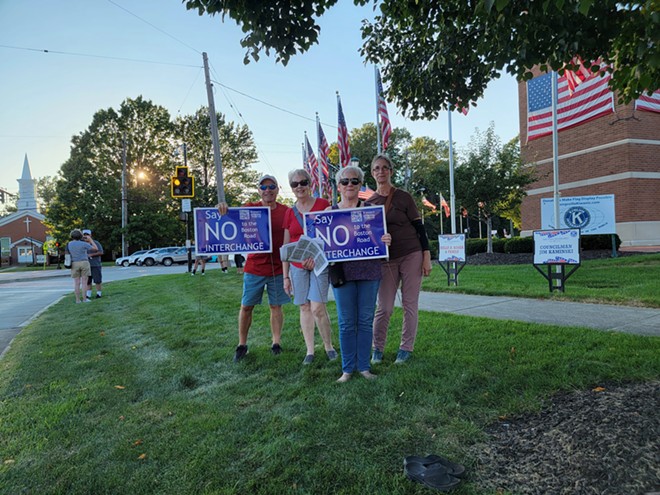
Maria Elena Scott
Brunswick and Strongsville residents rallied against the interchange outside a Strongsville City Council Meeting.
Ohio State Senator Mark Romanchuk has introduced legislation to repeal the portion of the Ohio State Transportation Budget requiring the construction of an interchange off of I-71 between Brunswick and Strongsville off Boston Road, the decision of which has been the subject of longstanding speculation and controversy.
“This proposed interchange was the result of one community, Strongsville, trying to legislate a neighboring community, Brunswick, to fix a problem they created,” said Representative Sharona Ray at a press conference Thursday. “This interchange is bad for Brunswick and all of Medina County for financial and safety reasons and is just bad policy overall. It is also, in my opinion, a violation of the Ohio Revised Code and the United States Highway Code, requiring local support.”
Residents wearing “Homes Not Highways” t-shirts and holding pictures of their houses gathered behind lawmakers at the conference. Many have been fighting the measure, introduced by Representative Tom Patton, for months. Although the stipulation mandating entrance and exit ramps at least every 4.5 miles on interstate highways in adjacent municipal corporations in different counties currently only applies to the border between Strongsville and Brunswick, it could be applied elsewhere in the future.
“This interchange as it stands sets a dangerous precedent for other areas in our state as well. It bypasses established channels like NOACA (Northeast Ohio Areawide Coordinating Agency) and the Federal Highway Association and that’s quite frankly not how these decisions should be made,” said Representative Melanie Miller.
Since 1997, the Transportation Review Advisory Council (TRAC) within ODOT has been responsible for assisting the department with selecting what new projects to approve and fund. The nine-person council explicitly prohibits members of the General Assembly from serving to avoid conflicts of interest.
“It’s a very dangerous precedent. I don’t think the taxpayers of Ohio want legislators to decide where the interchanges should go,” Romanchuk said. “We don’t know anything about interchanges. We don’t know anything about highway studies and traffic studies.”
According to a preliminary study by Strongsville-based civil engineering firm Euthenics Inc., which was commissioned by the city of Strongsville, as many as 14 houses would be demolished to construct the interchange. The study also admitted the new interchange wouldn’t drastically improve congestion along Route 82.
“By virtue of everything I have seen, there’s not one possibility that my house wouldn’t be absorbed and consumed,” said Ed Radzyminski, who lives at the intersection of Boston Road and North Carpenter Road. “These homes are the fruit of a lifetime of labor. We have invested our hearts, our souls, our bank accounts, everything that we have into these properties.”
Residents, many of whom have retired and live on fixed incomes, fear that they won’t be compensated adequately for the time and money they’ve invested in their homes. Those who won’t lose their homes say properties will lose value.
“We have celebrated life here — births, deaths, weddings, holidays, all sorts of family memories. And now, to be railroaded and ramrodded out of our efforts and our life efforts is just wrong,” Radzyminski said. “We’re looking at Attila the Hun fighting Mother Teresa.”
Patton, who maintains that he put the interchange mandate in the Transportation Budget to improve safety, told Scene that displaced residents could appeal in probate court if they weren’t sufficiently compensated and suggested they look for recourse from realtors that sold them their houses despite a “40-year safety issue”. He says that, despite a few complaints, responses have been overwhelmingly positive.
“I’ve had well over a hundred people that have said, ‘Way to go. Nice job. We’ve needed this forever,’” Patton told Scene.
The preliminary study supports the idea that an interchange would improve safety because, “a reduction in traffic congestion correlates to improved safety.” However, actual estimations of actual safety benefits are uncertain.
In a review of the preliminary study, ODOT said, “Why is ‘Safety’ presented first in this section, especially considering that this report really doesn’t compare the safety performance of alternatives vs. No Build or existing? Previous work suggested that safety benefits were expected to be minimal.”
Some Brunswick residents and leaders are convinced that the ultimate goal is to connect the Foltz Industrial Parkway to the highway.
“We have a huge stake because the whole point of the Boston Road interchange is to connect it to the Industrial Parkway.” Patton’s son-in-law, then Strongsville Councilman Duke Southworth said in 2013. “Our stake in the industrial parkway is a lot bigger than Brunswick’s stake.”
Patton denies intentions to connect the Industrial Parkway and said that he “can’t speak to what [his] son-in-law said 10 years ago but this is about safety.”
Lawmakers and Brunswick City Council President and Vice Mayor Nick Hanek met with ODOT representatives after announcing the legislation to repeal.
“We’re trying to work with [ODOT], but they’re in the constraints of this law. What Tom Patton is trying to do is break the government,” Hanek told Scene. “He wants ODOT to think it has to do it, he wants us to think it has to do it and he wants everybody to think it’s for a reason it’s not.”
Hanek believes it’s too soon to tell if the legislation will garner enough support to prevent construction of an interchange and hopes that lawmakers will recognize that it affects them and their constituents.
“Admittedly, we don’t always get things right; We don’t,” said Romanchuck. “I would like to think we get a lot of things right but we always get some things wrong. And today, what we’re talking about, is an example of something we got wrong and it was in the transportation budget.”
Subscribe to Cleveland Scene newsletters.
Follow us: Apple News | Google News | NewsBreak | Reddit | Instagram | Facebook | Twitter | Or sign up for our RSS Feed
This post was originally published on this site be sure to check out more of their content.






